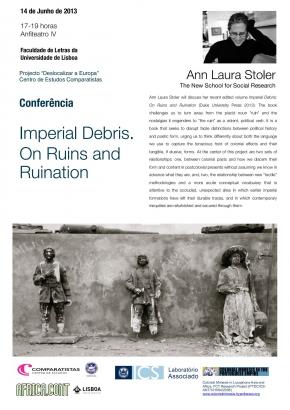The New School for Social Research
Posts tagged with The New School for Social Research
Archive
Author
- administrador
- adrianabarbosa
- Alícia Gaspar
- arimildesoares
- camillediard
- candela
- catarinasanto
- claudiar
- cristinasalvador
- franciscabagulho
- guilhermecartaxo
- herminiobovino
- joanapereira
- joanapires
- keitamayanda
- luisestevao
- mariadias
- marialuz
- mariana
- marianapinho
- mariapicarra
- mariaprata
- martacacador
- martalanca
- martamestre
- nadinesiegert
- Nélida Brito
- NilzangelaSouza
- otavioraposo
- raul f. curvelo
- ritadamasio
- samirapereira
- Victor Hugo Lopes
Data
- December 2025
- November 2025
- October 2025
- September 2025
- August 2025
- July 2025
- June 2025
- May 2025
- April 2025
- March 2025
- February 2025
- January 2025
Tags
- Canada
- claire bishop
- Cunnigham
- Deserto do Namibe
- festivais de arte
- Festival Interferências
- Greve geral
- ines nascimento rodrigues
- José Luís Hopffer Almada
- Maria Thereza Alves
- marlies wirth
- mudança social
- Nairobi
- post-colonial nations
- racismo em portugal
- Scúru Fitchádu
- Terceira Metade
- teste
- Valentina Homem
- Yuri Slezkine
Most read
- Maneiras de Ver: Empregadas Domésticas e Mulheres-a-dias em Portugal
- TEATRO MERIDIONAL PROMOVE AS JORNADAS DE REFLEXÃO SOBRE O IMPACTO DA DESCOLONIZAÇÃO NAS ARTES PERFORMATIVAS
- Deep time Soundings / Escuta do Tempo Profundo Palestra-Performance de Margarida Mendes
- Casa 75, Branca Clara das Neves
- À volta da Chama: uma conversa para celebrar o lançamento da revista Chama Rubra — Issue 01 Twinkle Twinkle
- Outros Itinerários: Viagens, Arte e Literatura Antropológica
- UIVO celebra 15 edições a imaginar mundo(s) sem guerra com a ilustração como ato de reflexão e resistência
- "Precópio" conversa com Kitty Furtado e Marta Lança
- Vale da Amoreira: Histórias da Cidade nas Margens, na Penhasco
- E Tudo Mudou, de Carla Fernandes
 Ann Laura Stoler will discuss her recent edited volume Imperial Debris: On Ruins and Ruination (Duke University Press 2013). The book challenges us to turn away from the placid noun “ruin” and the nostalgias it engenders to “the ruin” as a violent, political verb. It is a book that seeks to disrupt facile distinctions between political history and poetic form, urging us to think differently about both the language we use to capture the tenacious hold of colonial effects and their tangible, if elusive, forms. At the center of this project are two sets of relationships: one, between colonial pasts and how we discern their form and content in postcolonial presents without assuming we know in advance what they are, and, two, the relationship between new “tactile” methodologies and a more acute conceptual vocabulary that is attentive to the occluded, unexpected sites in which earlier imperial formations have left their durable traces, and in which contemporary inequities are refurbished and secured through them.
Ann Laura Stoler will discuss her recent edited volume Imperial Debris: On Ruins and Ruination (Duke University Press 2013). The book challenges us to turn away from the placid noun “ruin” and the nostalgias it engenders to “the ruin” as a violent, political verb. It is a book that seeks to disrupt facile distinctions between political history and poetic form, urging us to think differently about both the language we use to capture the tenacious hold of colonial effects and their tangible, if elusive, forms. At the center of this project are two sets of relationships: one, between colonial pasts and how we discern their form and content in postcolonial presents without assuming we know in advance what they are, and, two, the relationship between new “tactile” methodologies and a more acute conceptual vocabulary that is attentive to the occluded, unexpected sites in which earlier imperial formations have left their durable traces, and in which contemporary inequities are refurbished and secured through them.